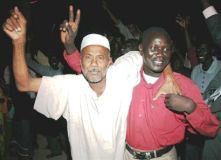Sudanese face task of north-south reconciliation
By Katie Nguyen
NAIROBI, Jan 9 (Reuters) – At the sports stadium where south Sudan’s peace deal was signed on Sunday, it was the traditional entertainers who most vividly illustrated the kind of barriers that reconciliation will face in Africa’s largest country.
 Here, bare-chested Dinka tribesmen in leopardskin loincloths performed leaping dances and wrestled each other.
Here, bare-chested Dinka tribesmen in leopardskin loincloths performed leaping dances and wrestled each other.
There, turbaned Arabs from the north performed stately sword dances, their robes swaying as they rocked back and forth.
The contrast was not lost on the dignitaries assembled to witness Sudanese First Vice President Ali Osman Mohamed Taha and rebel leader John Garang sign a deal to end 21 years of civil war in Sudan’s south that has killed two million people.
In a vast, sparsely populated country where many people live in isolation from other cultures, can former enemies from vastly different backgrounds become friends and build understanding?
The question was posed by Ugandan President Yoweri Museveni, who said the vexed issue of Sudanese identity lay at the heart of a conflict that pitted southern Christian and pagan rebels against Arabic-speaking Muslim northerners.
“The reality of the Sudan, we saw it here, when they were dancing,” Museveni said.
“The people of the turbans with the people of the ostrich feathers. How do these people live together respecting each other’s culture? This has been the problem of the Sudan.”
Since fighting broke out in 1983, discord over oil, ethnicity and ideology have muddied the southern campaign for more autonomy and a bigger say in government.
RECONCILIATION A DAUNTING TASK
The task seems particularly daunting in Sudan — a country that accommodates 500 different ethnic groups, 130 languages, Christianity, Islam and traditional African religions.
But many of the Sudanese dancing and singing in the Nairobi stadium were optimistic reconciliation could be achieved.
“Northerners and southerners can live together if they are faithful to each other,” said businessman Abbas el-Sheik el-Fazari, 65. “Extremism only creates problems for both sides.”
Born in the southern town of Torit, el-Fazari is a Muslim whose father was a Muslim northerner and whose mother was of mixed Dinka and Arab race. He said contact fostered empathy.
“You can find this bitterness in youngsters because they were born and grew up in war zones and have seen terrible things. But in truth, those who went to the north have different (sympathetic) ideas about northerners,” he said.
Millions of southern Sudanese populate towns and cities in the north, including the capital Khartoum.
Joseph Lang, a 55-year-old farmer from the south’s Bahr-el-Ghazal region, said he felt no hatred of northerners.
“As a people, they are good but as a government they are terrible. It is a trial,” he said of the peace deal. “We’ve been at war for more than two decades but we hit a quagmire and we’re now trying the alternative.”
Analysts say conflict in Sudan is rooted in the domination of post-independence politics by a small Arab elite with its home base north of Khartoum, to the detriment of fringe regions.
In his speech, Garang championed the idea of a “New Sudan” where people irrespective of religion, race, tribe or gender had a place alongside each other.
“(Diversity) viewed as a source of dissimilarity … will lead to the ultimate disintegration of the country, which is something we should do everything in our power to avoid,” he said.
